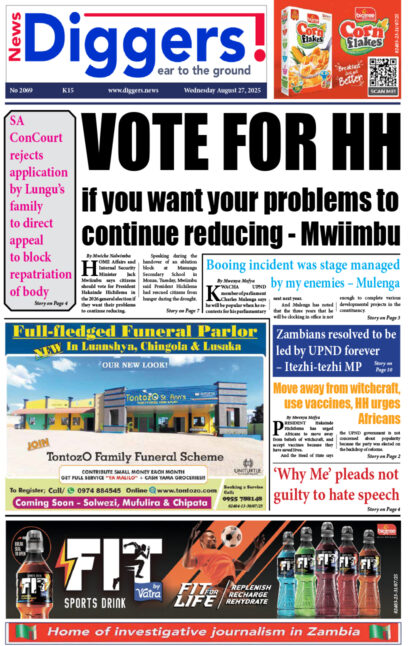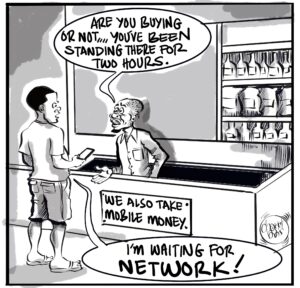Economist Chibamba Kanyama says it will be difficult for Zambia to survive without external financing as the current external debt position requires refinancing.
And Kanyama says Zambia’s global competitiveness ranking will not improve any time soon due to the number of economic challenges the country is facing.
Reacting to last week’s pronouncement by Minister of Finance Dr Bwalya Ng’andu who said the K30.6 billion foreign financing and grants allocated in the 2020 budget should not be misconstrued as new borrowing but rather disbursements from already contracted loans, Kanyama said in an interview that refinancing was the best option to sustain the country’s debt payments.
“First, right now with accumulating debt arrears plus a growing fiscal deficit, it is very hard for Zambia to survive without external financing. The external debt position right now requires refinancing, and best option would be concessional lenders who would swallow our burden until such a time when our economic growth rate will be high enough to sustain the debt repayments,” Kanyama explained.
“Our reserves may take time to build as we presently have an imbalance between outflows and inflows and unless the mining companies produce more than 1.5 million metric tones per annum, our reserves will continue to be subdued. In the meantime, government needs a good supply of foreign currency to the market to support the private sector, reassure creditors that funds will be available when due for repayment as well as meet its own needs as a government for importation of medicines, fuel and other national needs.”
He added that Zambia needed foreign financing in form of borrowing as bilateral grants were no longer flowing.
“It is for this reason we need foreign financing which comes by way of borrowings. Bilateral grants are no longer flowing as before because these previously covered up for budget shortfalls. This is even important now given that we have already committed our budget to carry-over debts, that will now sit on government Balance sheet as they get disbursed in 2020. The funding gap next year is to my understanding a reflection of commitments mainly in infrastructural projects that are already taking place, but disbursements and accounting as a loan to reflect in 2020,” Kanyama said.
“This is one area the Minister of Finance has to fully explain because the implication as things stand now, our debt position will rise next year on account of projects we committed to prior to 2020. The major impact therefore, will be on the increase in the interest payments in 2020. This aspect is being watched very closely by the existing creditors in the Eurobond and I hope the Minister has had sufficient time to engage productively while at the World Bank/IMF Annual Meetings.”
And Kanyama said Zambia’s global competitiveness ranking will not improve any time soon, due to the number of economic challenges.
He was commenting on revelations made last week by the Institute of Economic and Social Research, a research Institute of the University of Zambia and partner Institute of the World Economic Forum which revealed that Zambia had for the fourth year failed to improve its global economic rank.
This was according to the results of the 2019 Global Competitiveness Survey undertaken between February and April 2019 worldwide.
“It is not expected that Zambia’s global competitiveness ranking will improve in the short and medium term, given the level of economic challenges we are facing though there is a likelihood there will be marginal improvements once the infrastructural investments are completed. At the centre of factors affecting our competitiveness is the external and domestic debt position that has affected a number of other variables such as liquidity, exchange rate, inflation, foreign reserves and the economic growth rate. It is expected that a country that used to grow an average annual rate of 6.7 percent a few years ago and is now projected to grow at less than 3 percent per year cannot improve its rating,” said Kanyama.
“Given these factors, plus the climate change that has affected power supply and agriculture output, Government is presently in a dilemma as to an effective economic formula that can redress these declining fortunates. Government has tried to come up with various policies to re-engineer macroeconomic stability and support private sector growth but some of these policies, such as the recently rejected Sales Tax, were seen as policy reversal in the eyes of the investors. Remember that consistency of policy or having a stable policy environment ranks very highly in global competitiveness. Mining companies in particular have a long lead time in tens of returns or payback. It is for this reason policy consistency that determines payback period for their funders ranks very highly. I can state with certainty that 2020 may not be as easy as we project because [the] industry will just be recovering from the economic shocks of 2019; shocks ignited by power rationing, poor agriculture yields, lower than expected copper output and the high debt repayments. Let us get the IMF program on board quickly so that we can use that goodwill to reposition the economy. The austerity measures must apply but only strategically to avoid shooting ourselves in the foot.”
























